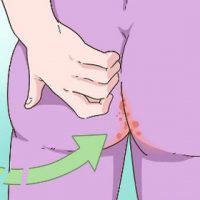What is Pruritis ani?

Pruritis ani means “itchy anus” in Latin. This condition causes irritation of the skin near the anus, resulting in a strong urge to scratch the area. In many cases, no specific problem is found to explain the itching. These cases are called “idiopathic” (from unknown cause).
Causes of Pruritis Ani
There are several potential causes of pruritis ani, as follows:
- Underlying conditions: Common anal conditions such as hemorrhoids, anal fissures or anal fistulas can cause itching. These conditions can worsen when a person repeatedly scratches.
- Excessive moisture in the anal area: This may be caused by sweat or a small amount of residual stool or mucus.
- Diet: Coffee, tea, carbonated beverages, beer, wine, milk products, cheese, chocolate, nuts, tomatoes and tomato-based products like ketchup have been associated with pruritis ani.
- Personal care: When a person suffers from serious itching, there is a tendency to wash the area too much. Scented soap and lotions can be irritating. Also, excessive cleaning can remove natural barriers, making the problem worse.
Treatment of Pruritis Ani
A thorough examination by a colon and the rectal surgeon may identify the cause of itching. In some cases, no underlying reason is identified. Treatment of pruritis ani involves preventing further irritation and moisture in the affected area and avoiding scratching.
- Do not use soap in the anal area.
- Do not scrub the anal area with anything including toilet paper.
- Rinse with warm water and pat the area dry or use a hairdryer set on “cool.”
- Use baby wipes or a wet washcloth, but only dab the area lightly and do not scrub it.
- Apply either wisps of cotton or a 4 x 4-inch gauze patch to keep the area dry.
- Avoid all medicated, perfumed and scented powders.
- Wear cotton gloves or socks on the hands at night to prevent scratching.
Medications
Use medications as directed by your physician. Apply prescription medications such as topical steroids sparingly to the anal area. Prolonged use of prescription or over-the-counter topical medications may result in irritation or skin dryness, making the condition worse.
Most people experience some relief from itching within a week. If symptoms do not resolve after six weeks, make a follow-up appointment with your physician. Recurring symptoms are not uncommon, and patients may need to make long-term lifestyle changes to remain symptom-free.
After your treatment, the nurse will go over few instructions and you will be given a prescription for few medications and an appointment for a postoperative checkup few days later.

